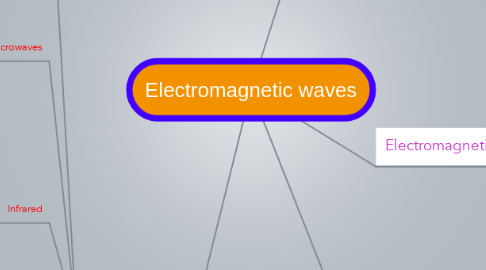
1. Components
1.1. Radio Waves
1.1.1. lowest frequency and longest wavelength
1.1.2. used for radio and TV broadcasting
1.1.3. heat up food due to friction and collision between rotating water molecule.
1.1.4. lowest frequency radio waves are reflected from an electrically charged layer of the upper atmosphere, called ionosphere
1.1.5. can reach receivers not in sight due to curvature of earth surface. eg. remote control cars and walkie talkie
1.2. Microwaves
1.2.1. refer to radio waves with short wavelengths
1.2.2. transmit great quantities of data due to higher frequencies.
1.2.3. repeater are used to receive, convert and transmit information over large distances.
1.2.4. eg. Microwave oven, satelite, radar and mobile phones
1.3. Infrared
1.3.1. causes molecules to resonate and vibrate
1.3.2. sun emits half of its radiation thru infrared and light bulbs emit infrared more than light.
1.3.3. eg. remote controls, night vision goggles, thermal imaging to detect virus such as SARS and H1N1
1.4. Visible Light
1.4.1. only range of frequencies visible to human eye produced by luminous objects
1.4.2. red light at low frequencies and violet light at high frequencies
1.4.3. colour of light is dependent on frequencies and wavelength
1.4.4. eg. optical fibres, light photography, endoscopy
1.5. Ultra- Violet
1.5.1. from the sun
1.5.2. stimulate production of melanin, kills bacteria and creates ultraviolet watermark on banknotes
1.5.2.1. stimulate production of melanin, kills bacteria and creates ultraviolet watermark on banknotes
1.6. X- rays
1.6.1. high frequencies and high penetrating capabilities thru objects
1.6.2. hazardous
1.6.3. high frequency and energy
1.6.4. eg. X ray medical imaging, airport security imaging
1.7. Gamma Rays
1.7.1. highest frequency and penetrating
1.7.2. emitted from radioactive decay of unstable atoms and isotopes
1.7.3. kill cancerous cells but also healthy cells
1.7.4. medical tools are sterilized with gamma rays
2. Properties
2.1. transverse wave
2.1.1. Task 1
2.1.2. Task 2
2.2. does not require medium to propagate
2.2.1. Call 1
2.2.2. Call 2
2.3. travel at a speed of 3.0 x 10^8 m/s
2.4. obey general wave equation where c is the light speed
2.4.1. speed of light = wavelength / period
2.4.2. speed of light = frequency x wavelength
2.5. obey laws of reflection and refraction
3. Electromagnetic spectrum
3.1. consist of EM waves of continuous range of frequencies.
3.2. visible light spectrum forms part of electromagnetic spectrum
3.3. no fixed boundaries in frequencies of each group of electromagnetic waves
3.4. high frequency leads to
3.4.1. low wavelength
3.4.2. greater amount of energy carried by the EM wave
4. Type of radio waves
4.1. Space waves
4.1.1. 30-300 MHz Line of sight Emergency uses it
4.1.2. Space waves are sky waves with a frequency greater than 30 MHz, which pass through the ionosphere. Line between receiver and transmitter is not blocked by mountains. It uses by police and emergency services and television transmitter.
4.2. Sky waves
4.2.1. 3-30 MHz Worldwide by reflection Radio uses it
4.2.2. The component of an electromagnetic wave (especially a radio wave) that travels directly from transmitter to receiver without being reflected.
4.3. Ground waves
4.3.1. Up to 3 MHz 1000 km AM broadcasts
4.3.2. Ground wave refers to the propagation of radio waves parallel to and adjacent to the surface of the Earth, following the curvature of the Earth
